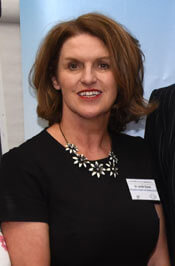Managers need training in health and well being and should be able to recognise and deal with their own stress and stress among their staff, according to Dr. Lynda Sisson, HSE National Clinical Lead for Workplace Health and Well Being for health service employees. Maureen Browne reports.

Dr. Sisson has been appointed under the HSE HR People Strategy to implement a health and well being framework for all HSE employees and to develop a workplace health strategy and an employee support and staff engagement scheme.
“Stress is considered a risk and assessed in the same way as a physical risk. We are going to look at stress like any other hazard in the workplace. Managers need to be very cognisant of their own stress levels and be able to use stress risk assessment tools.
“We have adapted a stress risk assessment tool from the Management Standards from the UK Health & Safety Executive.
Managers need to be very cognisant of their own stress levels and be able to use stress risk assessment tools.
“Last year, we rolled out training in the use of risk assessment tools and trained over 500 managers trained in stress risk assessment. This year we are adopting the broader Work Positive Tool and are developing a trainee programme for this at present
Dr. Sisson’s portfolio covers six areas – (1) staff health and safety, (2) staff counselling, (3) injury management, rehabilitation and return to work for employees, (4) occupational health services for staff, (5) the work positive programme, (which includes examining and assessing stress in the workplace and having a programme in place where people are exposed to critical events or particularly stressful situations) and (6) liaising with Healthy Ireland to provide generally for the health and well being of staff.
She has already carried out a broad spectrum of work across her portfolio.
“On the rehabilitation side, we are developing a streamlined approach for rehabilitation, with early intervention, return to work and re deployment where necessary for any employees who becomes injured or suffers a long term illness.
“The work positive programme is being implemented in conjunction with the State Claims Agency. Emer Carroll from our Health and Safety department is leading out on its development and national roll out.
We would also be looking at standards for employers including voluntary hospitals, Community Health Organisations, the HSE, the postgraduate training bodies, the Medical Council (which accredits the medical schools) and the policy makers.
“We have already launched Occupational Health Standards, which were developed with HIQA, for the delivery of an occupational health strategy in health service and staff will be trained to implement these over the summer,” said Dr. Sisson.
“Standards for employee assistance – also based on the HIQA framework – are being developed and will be launched in November.
“In the health and safety function we are looking at preventing incidents and providing a safe place to work for all staff.”
Dr. Sisson said that a considerable amount of work had already been done that indicated doctors were under particular stress in the workplace. “We had information on this anecdotally and from the RCPI National Study of Wellbeing of Hospital Doctors in Ireland and from the Medical Council report ‘Your Training Counts’
“A lot of Work dealing with these concerns had been going on in an ad hoc fashion. I convened a group to look at standards for health and wellbeing for doctors in work. Representatives of Consultants, GPs, NCHDs, the postgraduate training bodies, such as the RCSI, the RCPI and the College of Anaesthetists, medical students, the unions and management are among a broad range of people sitting around a table trying to address this issue.
“We will be launching Standards in October. It is likely that we will be recommending standards for self care for doctors, standards for medical schools which would incorporate training on health and well being and training for staff to be cognisant of and to recognise stress factors.
“We would also be looking at standards for employers including voluntary hospitals, Community Health Organisations, the HSE, the postgraduate training bodies, the Medical Council (which accredits the medical schools) and the policy makers.
“We want to see a quality assurance and improvement framework that would capture real time information and ensure this would be followed up – in the case of hospitals, at Board level and at Hospital Group level – to ensure compliance.
“We also want to make sure non consultant doctors know they have access to support and we are looking at streamlining that support with lead NCHDs.”

